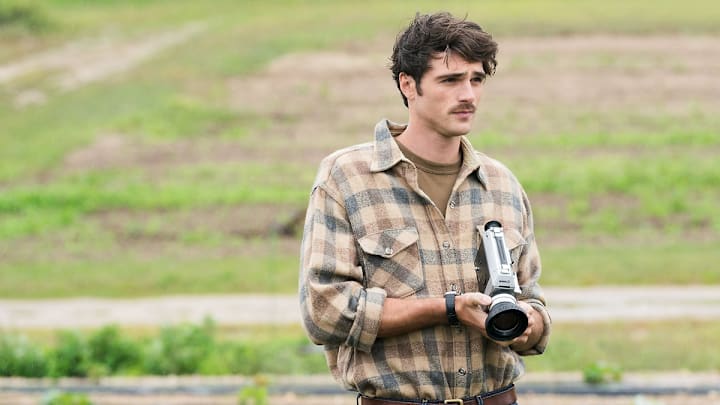“Somebody has to do something!” So goes one of writer/director Paul Schrader’s most famous First Reformed lines. Schrader’s titles typically involve deeply tormented (often exceedingly reprehensible, like with Travis Bickle) men navigating a discernible rotting America. Such figures also frequently believe they're a "chosen one" meant to rectify society's wrongs. This extends all the way back to his screenplay for the 1976 Martin Scorsese directorial effort Taxi Driver.
Typically, such stories feature the protagonists making drastically active decisions to leave a mark on this planet. They strap bombs to their chest, murder their former superiors, get crucified for all the world to see, or do something else to etch their names into history books. Even his Japan-set 1985 feature Mishima: A Life in Four Chapters concludes with the titular Yukio Mishima after his attempt to take back the nation of Japan is met with scorn, committing an infamous instance of seppuku.
Schrader's latest film, Oh, Canada, is a fascinating departure from his cinematic standards. Once again, Schrader focuses on a psychologically fractured male protagonist. This time, though, this man is not convinced he can change the world. There will be no finale where Willem Dafoe gets brutally murdered or the lead character accidentally becomes a hero in local newspapers. Oh, Canada’s lead is dying. Mortality and regret weigh on his mind. The kind of redemption Master Gardener’s protagonist secured is not coming for this man.
Oh, Canada begins with elderly documentary filmmaker Leonard Fife (Richard Gere) as he's succumbing to a lengthy battle with cancer. Immediately, one can see parallels between Fife and Schrader in their occupations and ages...but it’s not a 1:1 parallel. In real life, Schrader's wife, Mary Beth Hurt lives in an assisted living facility as she grapples with Alzheimer's. Fife is a combination of Schrader’s artistic exploits and his significant other’s vulnerability. That instills fascinating rawness in Oh, Canada’s lead character, who begins this feature ready to come clean about his past.
These testimonies are captured on camera by former students turned documentary directors Malcolm (Michael Imperioli) and Diana (Victoria Hill). Fife proceeds to tell non-linear recollections of his earliest years (where he's portrayed by Jacob Elordi). He tries his best to recall his formative days as a lover and an artist. However, thanks to his advanced age and mental struggles, Fife’s anecdotes keep intersecting with his work. Fiction has become a reality. Actual slices of life are fleeting images in his mind. All the while, Fife, in the present, constantly calls out for his wife Emma (Uma Thurman). She's the reason he's doing this in his final days on Earth.
Aching melancholy fascinatingly permeates Oh, Canada. Gere and Schrader's big American Gigolo reunion is not an opportunity to name-drop old movies. Instead, they're exploring how recalling the past is often a fool’s errand. When you’re watching a narrative movie, you’re witnessing a very select and specific segment of the past. People chose to have certain things in or excluded from the frame. More often than not, our memories work in a similar fashion, especially when uncontrollable psychological maladies begin affecting them. The unreliability of cinema intersects with the fickleness of memory in Schrader’s hands.
This manifests in quietly devastating ways throughout the feature, such as the older version of Fife temporarily taking over his younger form in his earliest memories. Is this memory so intricately archived in his brain that he can only interact with it as an older man? Is the presence of his 2024 self indicating he’s making up in the here and now? Fluctuating color scheme and aspect ratios also strikingly reflect the instability of Fife's yesteryear yarns. What is the “visual reality” of Oh, Canada? No firm answer emerges, which deftly places us into Fife’s fractured mindset. All these thoughtful touches leave viewers with lots to ponder and an evocatively lugubrious atmosphere to simmer in.
Even with so much weighty material to offer, Oh, Canada has plenty of rough edges, including some odd editing. Most peculiar is a recurring decision to focus on sequences totally divorced from Leonard Fife's perspective, such as Emma having a quiet sit-down with his long-absent son. The intent behind these scenes is quite clear. They demonstrate Fife’s legacy being larger than what’s in his brain or how he influenced leftist documentary cinema. However, leaping away from Fife’s deeply restricted point of view is a bit disappointing. The psychological claustrophobia of Oh, Canada would register as extra devastating if we only witnessed things from Fife’s eyeballs.
Certain shaggy Oh, Canada bits (like amusingly on-the-nose hair colors and fashion choices to signify the “young” member of Malcolm's crew) keep it from being on par with Schrader's greatest directorial efforts like Mishima, Blue Collar, or First Reformed. However, it’s still a mighty moving motion picture that fascinatingly interrogates rather than celebrates its protagonist. Malcolm keeps waxing poetic about Fife’s achievements in art and activism. However, all this man can think about is a life of abandonment. Even in his idealistic youth (where he’s thoughtfully portrayed by Elordi), Fife was defined by leaving things behind.
The public sees Fife as a revolutionary. In his stark anecdotes, Fife sees not just a rotting world, but the rot inside himself. Oh, Canada’s ending does not involve bullets or bombs. Instead, it focuses on images contrasting young Fife arriving in Canada so full of hope and an elderly Fife knocking on death’s door. This raw reflective exercise won’t dazzle those understandably ambivalent to Schrader’s erratic filmmaking track record (as reflected in last year’s messy undercooked Master Gardener). For the rest of us, Oh, Canada registers as a contemplative mournful look at how little control we have over our legacy and even memories. All we can do is tell our stories and hope somebody somewhere listens.
